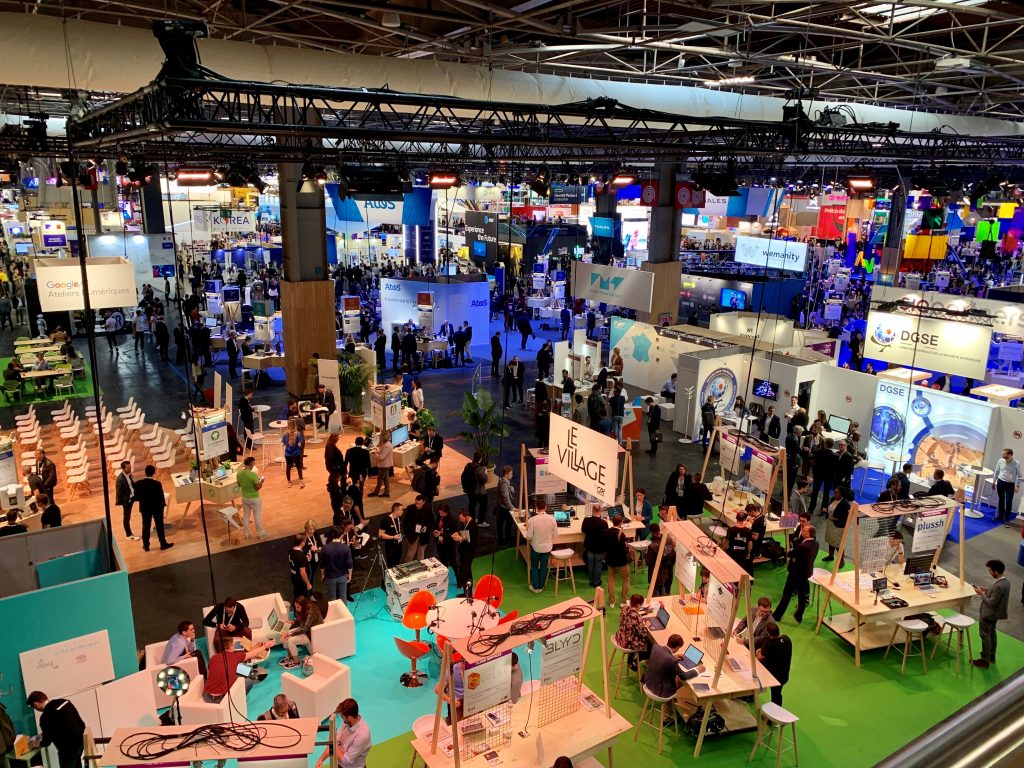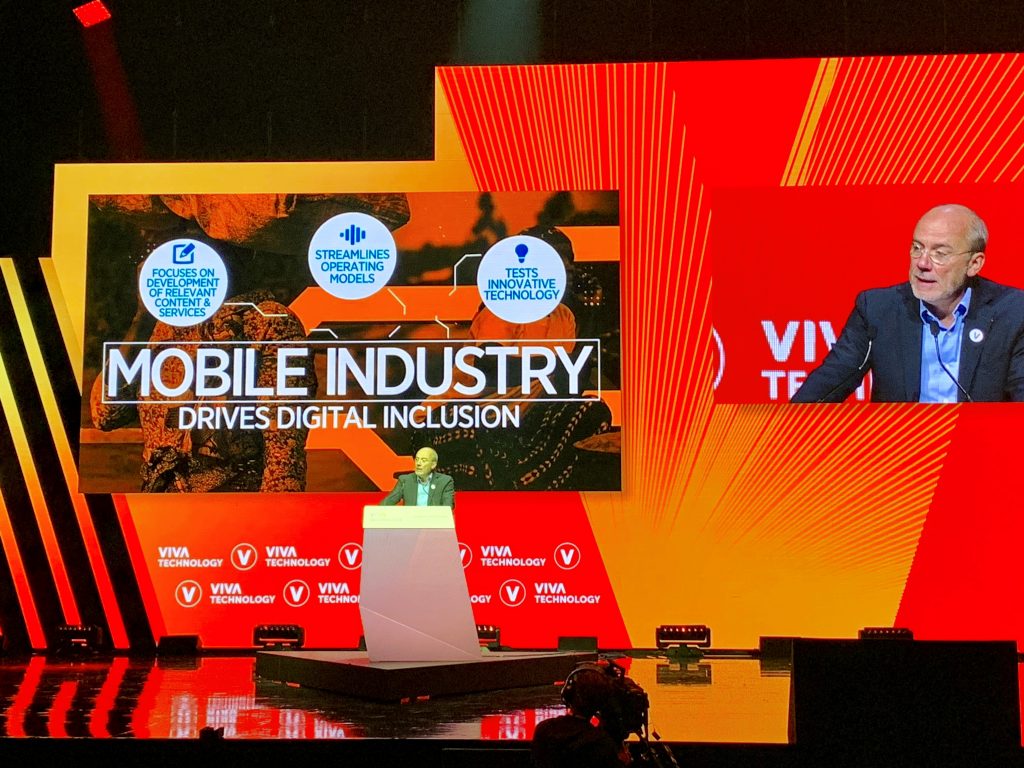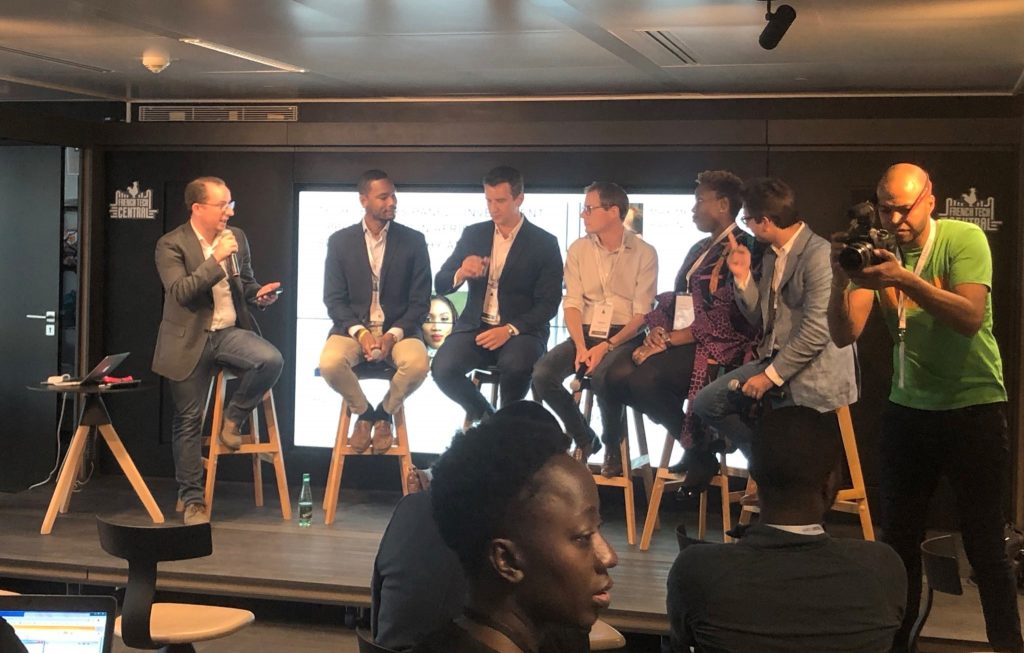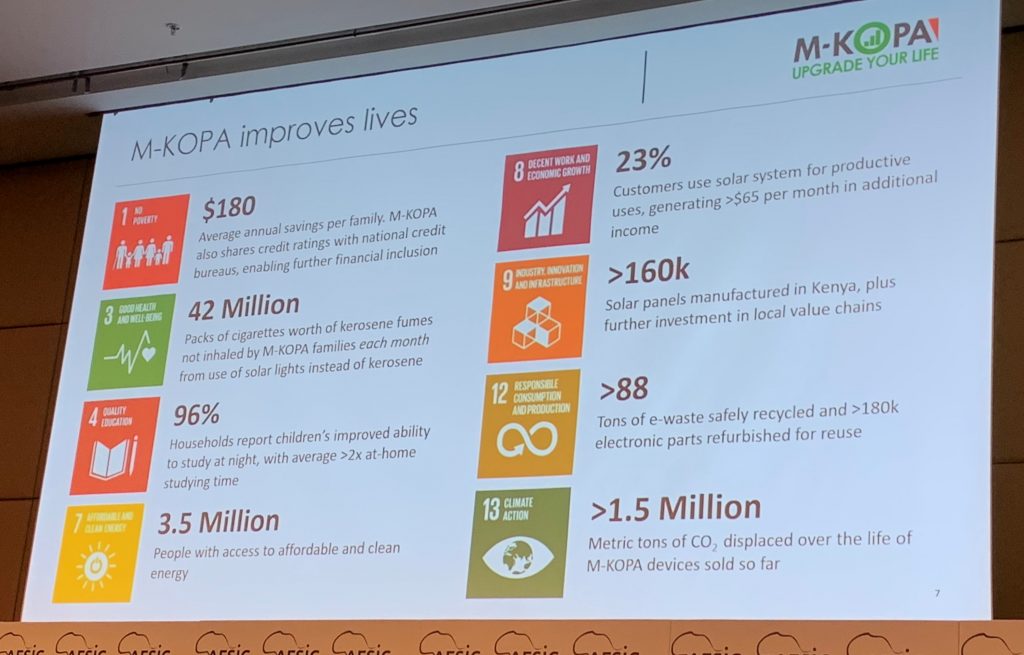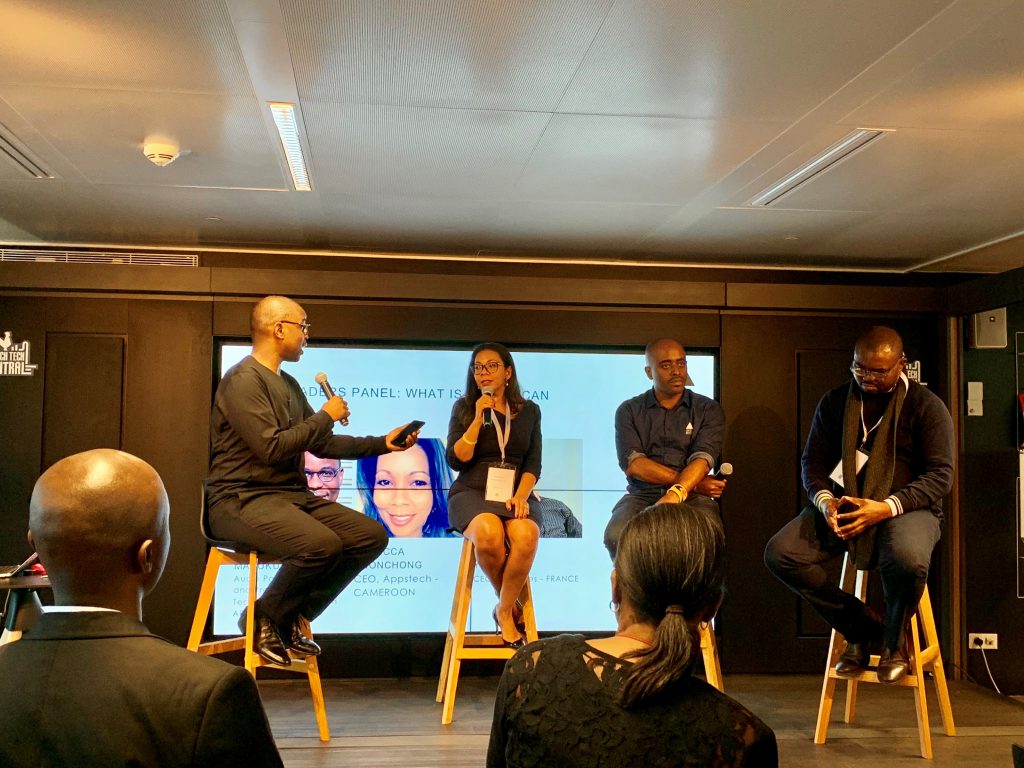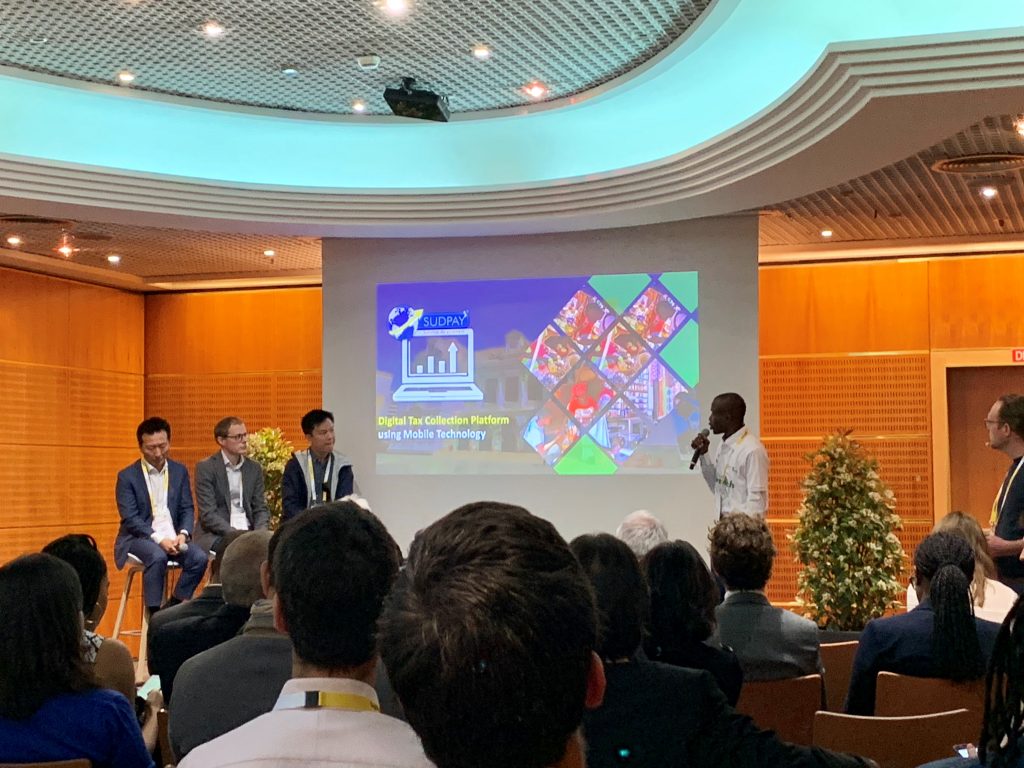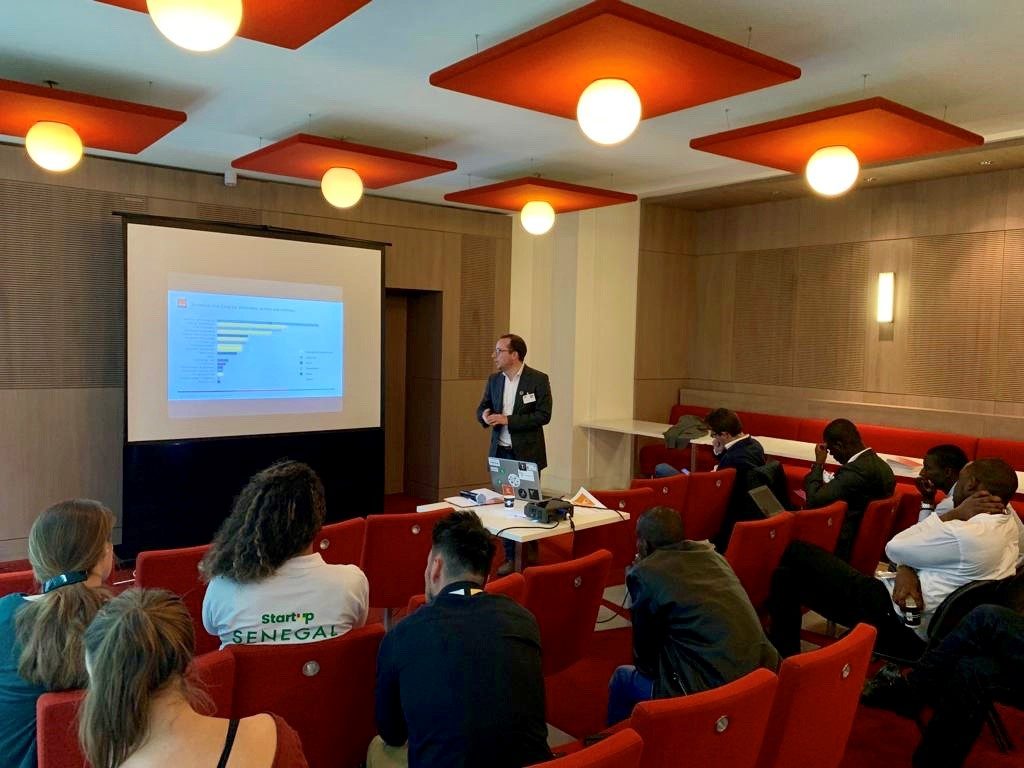Between 8 and 17 May 2019, the GSMA Ecosystem Accelerator team, represented by Max Cuvellier and Maxime Bayen, was invited to participate in three consecutive events focused on African Tech in London and Paris. We had the opportunity to present our work for the first time at the AFSIC conference this year, on the topic of ‘Investing in Africa’, and convened with a number of Africa-focused investors, tech hubs and start-ups to answer this year’s Afrobytes conference theme and question, ‘Where do we go from there?’. Africa was also a very prominent focus at the 2019 edition of VivaTech that we attended on 16 and 17 May, as over 100 African start-ups were represented throughout this now major event for the European tech ecosystem. As it is now a tradition for our team, we thought we would share our takeaways.
VivaTech 2019 exhibition floor
Inclusion: Doing good business by doing good
‘Tech For Good’ was on everybody’s lips at the fourth edition of VivaTech in Paris where the CEOs of Engie, L’Oreal, IBM, Orange, Samsung, Alibaba, but also heads of state like Canada’s Prime Minister, Justin Trudeau, or France’s President, Emmanuel Macron, discussed the topic on stage.
“The figures tell us that the digital divide is about much more than just digital technology”, stated Orange’s CEO and Chairman of the GSMA Board, Stephane Richard, on stage before “calling on everyone to work together to innovate and explore new ways of connecting the world and overcoming the digital divide”. He added, “And let’s be clear, we’re not talking about an act of charity. I’m convinced that the collective benefit that will emerge by enabling several billion people to use the web and by disseminating data will be more than worth the investment required to achieve it”.
Stephane Richard, CEO of Orange, at VivaTech
Beyond digital inclusion, African tech is also a strong enabler of financial inclusion. This message was conveyed by both Senegal-based fintech start-up Touch’s CEO, Omar Cisse, and our team’s head, Max Cuvellier, when interviewed by Fatimata Wane-Sagna on France24 during the Afrobytes conference.
To fuel this inclusive African tech, there is still a growing need of capital in the ecosystem. A topic we had the opportunity to discuss with a number of institutional and private investors during a panel we moderated at Afrobytes.
The panel we moderated at Afrobytes with [left to right]: Mike Mompi, Enza Capital / Gregory McDonald, Edge Growth Capital / Johann Choux, Proparco / Uche Ogboi, Echo VC / Gregoire de Padirac, Orange Digital Ventures
Funding for African start-ups is growing, from $367 million in 2016 and $560 million in 2017, according to VC firm Partech, in 2018 African tech start-ups raised $1.163 billion in equity funding. Meanwhile, several new funds focused on Africa are seeing the light of day, like Enza Capital, launched during 2019’s first quarter. However, several ecosystem stakeholders like Proparco’s Johann Choux were calling local banks to also do their share by offering more attractive lending solutions to local tech entrepreneurs. Another message heard across the conferences was a call for more funding (potentially from institutions or governments through local or regional funds) at seed level to ‘de-risk’ the local ecosystems.
- Two start-ups that were present across these events and which we thought are illustrating inclusive African tech were:
GiftedMom, Cameroon: A start-up offering health information tips and monitoring services to pregnant women and nursing mothers via an assistant mobile app, web, USSD and SMS. GiftedMom is one of the start-ups funded by the GSMA Ecosystem Accelerator Innovation Fund (see GiftedMom’s case study in our latest Ecosystem Accelerator Compass publication) - M-Kopa, Kenya: One of the leading pay-as-you-go (PAYG) Solar Home System solutions provider in the continent – funded back in 2013 by the GSMA Mobile for Development (M4D) Utilities Innovation Fund – was present at AFSIC conference and shared their ambition to deliver an inclusive and impactful solution tackling no less than eight of the UN SDGs.
M-Kopa presentation at AFSIC
Innovation: Thinking outside the Silicon Valley box
With these conferences taking place just in the middle of a significant online debate on what defines an ‘African start-up’ following the Jumia IPO, the topic was unavoidable throughout the week. While it wouldn’t be feasible to summarise these discussions here, we found this statement by AppsTech CEO and Founder, Rebecca Enonchong, to be a good approach, “My hope is that our African tech ecosystem never looks like the Silicon Valley. We need more diversity in the funding, in the entrepreneurs, everywhere”.
Andile Masuku, Africa Tech RoundUp, moderating the panel “What is an African Start-up?” at Afrobytes conference with Rebecca Enonchong, AppsTech / Ammin Youssouf, Afrobytes / Charles Ojei, Hybr
‘Double-clicking’ on the continent, this mindset is also reflected at sub-regional levels as several efforts are now ongoing to specifically enable the growth of regional ecosystems. This is the case of L’Afrique Excelle, a World Bank-funded acceleration programme for African start-ups – which we have been proud to support as jury member and mentor – implemented with the support of VC4A and Suguba, now in its second edition and focusing this year on Francophone Africa start-ups. After short-listing 10 start-ups during a first residency held in Bamako, Mali, the initiative offered the opportunity for entrepreneurs to come and pitch their work in a series of France-based events including Afrobytes and VivaTech.
- Two examples of start-ups present this week and which we thought were quite innovative in terms of the challenge they offer to tackle:
SudPay, Senegal: A mobile solution for small merchants to pay taxes to municipal authorities transparently. SudPay is one of the start-ups funded by the GSMA Ecosystem Accelerator Innovation Fund. - Teliman, Mali: A digital solution for taxi-motos in Bamako that also allows drivers to acquire their motorbike through a financial inclusion scheme.
Samba Sow, CEO and Co-founder of Sudpay, pitching their solution at VivaTech
Digital: The fast track to scale
“In 2025, a quarter of the world’s digitally active population will be in Africa” stated Facebook’s Africa Head, Nunu Ntshingila, on stage at VivaTech.
This statistic summarises the opportunity but also the challenge ahead for tech entrepreneurs in Africa. Leveraging digital and mobile solutions (from USSD to blockchain) is in the DNA of this ecosystem and definitely a powerful way to develop and scale local services. But this statistic also means these markets are constantly on the move, jumping from a technology or device to another. As a result, African tech entrepreneurs more than ever need to find the right technology mix to reach their market today (still mainly leveraging what we call ‘low-tech’, i.e. voice, SMS, or USSD – see our deep dive on, ‘Reaching further with low tech’ in our latest Ecosystem Accelerator Compass publication) while anticipating tomorrow’s market (mainly smartphone-equipped and online).
Working with local mobile operators could help tackle this challenge. During our workshop organised for the 10 L’Afrique Excelle start-ups and held at Orange HQ with the support of Orange CSR, Orange Digital Ventures and Orange Fab Dakar teams, we broke down the approach African tech entrepreneurs should take to engage and collaborate with mobile operators on the continent.
Our workshop at Orange HQ office with the 10 start-ups from L’Afrique Excelle programme
To conclude this blog post, we would like to thank the teams of AFSIC, Afrobytes (Haweya Mohamed & Ammin Youssouf), Vivatech and L’Afrique Excelle (Alina Vinogradova, Ben White, Simon Duchatelet in particular) for allowing us to participate and contribute to their respective events and initiatives.
The Ecosystem Accelerator programme is supported by the UK Department for International Development (DFID), the Australian Government, the GSMA and its members.




